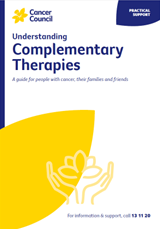- Home
- About Cancer
- Living well
- Complementary therapies
- Individual therapies
- Chinese herbal medicine
Chinese herbal medicine
What is it?
Chinese herbs are a key part of Chinese medicine. Different parts of plants, such as the leaves, roots, stems, flowers and seeds, are used. Herbs may be taken as tablets or given as tea.
Why use it
Some people believe that herbs can unblock meridians and bring harmony to the forces in the body, such as Yin and Yang.
What to expect
The practitioner will take a case history and assess how your body is out of balance. This will include a tongue and pulse analysis. They will choose a combination of herbs and foods with the aim of bringing your body back into balance.
Chinese medicine practitioners make a formula tailored specifically to your condition, or they can dispense herbal medicines pre-packaged as granules, pills or raw herbs.
What is the evidence?
As with Western herbal medicine, many Chinese herbs have been scientifically evaluated for how well they work for people with cancer. Studies have found benefits for some herbs, such as American ginseng for cancer-related fatigue. Research is continuing to examine the benefits of different herbs and different herbal combinations.
Chinese herbal medicine is a complex area and it’s best to see an experienced practitioner rather than trying to treat yourself. See these tips on using herbs safely and check your practitioner is registered with the Chinese Medicine Board.
Meditation and Relaxation Podcast
Listen to more of our meditation and relaxation podcast for people affected by cancer
More resources
Dr David Joske, Clinical Haematologist, Sir Charles Gairdner Hospital and PathWest, Chairman and Founder Solaris Cancer Care Foundation, Clinical Professor of Medicine, The University of Western Australia, WA; Australasian Integrative Medicine Association (AIMA); Dr Robert Blum, Clinical Director, Cancer Services, Bendigo Health, NSW; Sally Brooks, Senior Pharmacist, Medicines Information, Peter MacCallum Cancer Centre, VIC; Dr Suzanne Grant, Senior Research Fellow, NICM Health Research Institute, Western Sydney University, and Chris O’Brien Lifehouse, NSW; Prof Danforn Lim, Adjunct Professor and Advisory Board Member, NICM Health Research Institute, Western Sydney University, and Adjunct Professor, UTS, NSW; Christina Line, Statewide Services Senior Coordinator, Cancer Council WA; Jen McKenzie, Physiotherapist (Lymphoedema) and ESSA Accredited Exercise Physiologist, The McKenzie Clinic, QLD; Simone Noelker, Wellness Centre and Pastoral Care Manager, Ballarat Regional Integrated Cancer Centre, VIC; Dr Nirzari Pandit, General Practitioner, RACGP Specific Interests Integrative Medicine Group, NSW; Georgie Pearson, Consumer; Cris Pirone, Counsellor, Cancer Council SA; Dr Elysia Thornton-Benko, Specialist General Practitioner, and UNSW Research Fellow, NSW; Kirsty Trebilcock, 13 11 20 Consultant, Cancer Council SA.
View the Cancer Council NSW editorial policy.
View all publications or call 13 11 20 for free printed copies.

